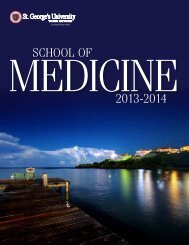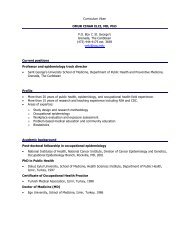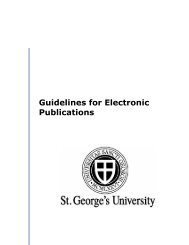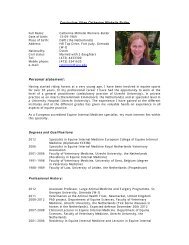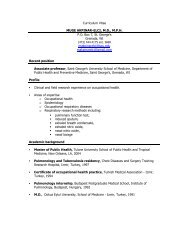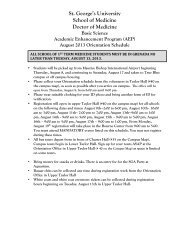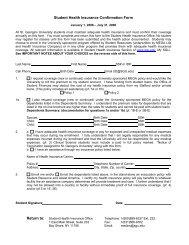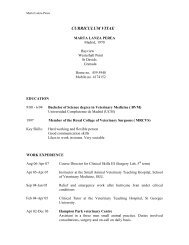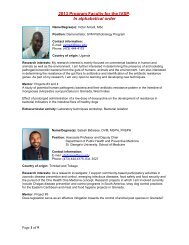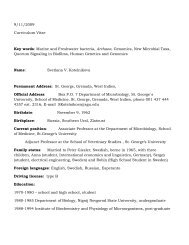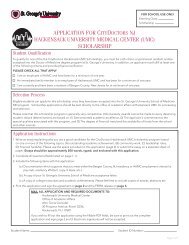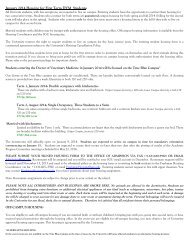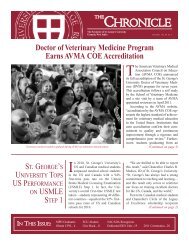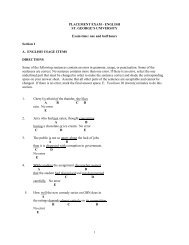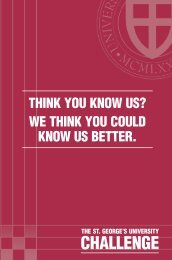SVM Catalogue 2012-2013 - St. George's University
SVM Catalogue 2012-2013 - St. George's University
SVM Catalogue 2012-2013 - St. George's University
You also want an ePaper? Increase the reach of your titles
YUMPU automatically turns print PDFs into web optimized ePapers that Google loves.
School of Medicine<br />
Course Descriptions<br />
treatment, and short- and long-term care of exotic animal<br />
species through the use of applicable references and peerreviewed<br />
journals for alternative species medicine.<br />
PTHB 534<br />
Problem Solving in Veterinary Parasitology<br />
(1 cr.) (Didactic and Laboratory) This course provides<br />
students an opportunity to conduct literature searches<br />
regarding new research techniques in veterinary<br />
parasitology and become current with updates regarding<br />
treatment and control strategies. Oral communication skills<br />
and problem-solving techniques are emphasized.<br />
LAMS 534<br />
Surgical Emergencies in Horses<br />
(1 cr.) (Didactic and Other) This course will prepare equineoriented<br />
students to recognize and assess common<br />
emergencies presented to equine general practitioners by<br />
utilizing case-based discussions to illustrate each emergency<br />
situation. <strong>St</strong>udents will explore current and relevant literature<br />
supporting the use of goal-directed medical, surgical, and<br />
anesthetic techniques of equine medicine today.<br />
LAMS 535<br />
Special Topics in Equine Surgery<br />
(1 cr.) (Laboratory) This course provides an opportunity for<br />
equine-oriented students to work through equine surgical<br />
cases with emphasis placed on education for the general<br />
equine practitioner. <strong>St</strong>udents are required to utilize their<br />
veterinary foundation courses, as well as to investigate<br />
other sources of information to understand these commonly<br />
encountered surgical problems in equine medicine.<br />
LAMS 536<br />
Special Topics in Equine Medicine<br />
(1 cr.) (Didactic and Other) This course provides an<br />
opportunity for equine-oriented students to investigate<br />
special topics in equine medicine with emphasis placed<br />
on education of the general practitioner in equine<br />
veterinary medicine. Through individual research,<br />
team presentations, and small group discussions,<br />
students are provided the opportunity to enhance their<br />
knowledge base and improve their skills in diagnosis<br />
and management of commonly encountered diseases in<br />
equine medicine today.<br />
SAMS 530<br />
Problem-Based Learning in Small Animal Medicine<br />
(1 cr.) (Didactic) This course utilizes the most current<br />
and relevant diseases observed by today’s small animal<br />
practitioner to provide an opportunity for students<br />
to generate case-based discussion and practice case<br />
management. <strong>St</strong>udents will be encouraged to develop<br />
diagnostic and therapeutic plans as well as effective followup<br />
examination practices.<br />
SAMS 531<br />
Advanced Cardiology<br />
(1 cr.) (Didactic and Laboratory) An in-depth and<br />
extensive didactic and laboratory-based approach to<br />
cardiology is introduced utilizing research, pertinent<br />
medicine, laboratory diagnostics, advanced imaging, and<br />
therapeutics for a listing of the most common canine and<br />
feline cardiovascualar diseases.<br />
SAMS 532<br />
Small Animal Behavior<br />
(1 cr.) (Didactic and Laboratory) This course emphasizes<br />
treatment of problem behaviors and effective means of<br />
increasing the success of client compliance in treating<br />
behavioral disorders. Three laboratory sessions encourage<br />
active student involvement in resolving problem behaviors<br />
and dealing with angry or distraught clients.<br />
Year 3: Terms 5 and 6 Elective Courses<br />
All Year 1: Terms 1 and 2 elective courses and Year 2: Term 4<br />
elective courses listed above are available to Year 3: Terms<br />
5 and 6 students.<br />
Year 4: Terms 7, 8, and 9 Required Curriculum<br />
Year 4 consists of 48 weeks of clinical training at one of<br />
our 29 affiliated AVMA-accredited veterinary schools: 20<br />
weeks of instruction in seven core subjects and 28 weeks<br />
of electives that may be a continuation of core subjects<br />
or concentrations in select specialties. The clinical core<br />
subjects include a minimum of four weeks each in small<br />
animal medicine and small animal surgery, six weeks of<br />
large animal medicine and surgery; and two weeks each<br />
in diagnostic laboratory, clinical anesthesiology, and<br />
diagnostic imaging. The remaining weeks of the clinical<br />
program are made up of elective rotations (clinical<br />
rotations). Externships approved by the affiliated schools<br />
may be included in the clinical training program.<br />
56 | <strong>St</strong>. George’s <strong>University</strong>



